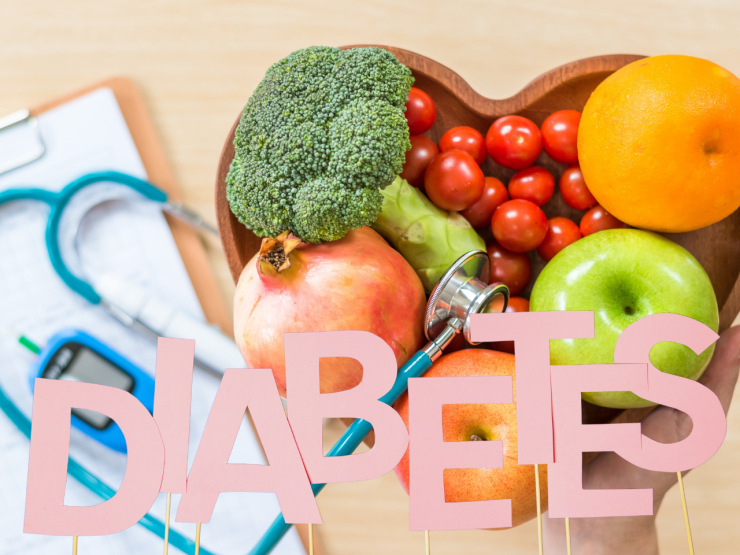Diabetes Blog
Being diagnosed with diabetes may leave you feeling an array of emotions, you might feel anxious, confused, numb, shocked, scared or stressed.
Your mind may be racing with questions, and you might find it difficult to come to terms with your diagnosis. These are normal feelings, and you are bound to feel overwhelmed. However, the majority of those living with the condition state they find balance and over time can adjust and live a fulfilled balanced life.
In this blog, we will try to answer some questions you might have about diabetes if you or someone you know has been recently diagnosed.
What is Diabetes?
When your blood glucose, commonly known as blood sugar, is too high, you develop diabetes. Your primary energy source is blood glucose, which is obtained from the food you eat. The pancreas produces the hormone insulin, which facilitates the entry of food-derived glucose into your cells for energy production. Your body occasionally produces insufficient or no insulin, or it uses insulin poorly. As a result, glucose remains in your circulation and does not enter your cells. Over time, health issues might result from having too much glucose in the blood.
Although there is no cure for diabetes, you can manage it and maintain your health. Maintaining a healthy blood sugar level is crucial because if it increases too much, it could harm your organs, blood vessels, and nerves.
Type 1, type 2, and gestational diabetes (diabetes while pregnant) are the three primary types of diabetes.
Type 1: In the UK, type 1 diabetes affects about 8% of the population. It is a severe, chronic condition.
It is believed that an autoimmune reaction is what causes type 1 diabetes. The beta cells, which produce insulin in the pancreas, are destroyed by this autoimmune process. Although it typically appears in children, teens, and young adults, it can occur at any age.
If you have type 1 diabetes, your body will continue to convert the carbohydrates in food and drink into glucose. But there is no insulin to let the glucose into your body's cells when it reaches your bloodstream. The result is an increase in blood sugar levels as more and more glucose accumulates in the bloodstream.
Insulin injections are typically used to manage it.
Type 2: In the UK, type 2 diabetes affects approximately 90% of those living with the disease. It is a severe and potentially lifelong condition.
When you have type 2 diabetes, your body continues to convert the carbohydrates in your food and drink into glucose. The pancreas subsequently releases insulin in response to this. However, because the insulin is unable to function correctly, your blood sugar levels continue to increase. More insulin is consequently released. This may gradually wear out the pancreas in some type 2 diabetics, causing their bodies to produce less and less insulin. This puts you at risk for hyperglycaemia and can result in even higher blood sugar levels.
Being overweight or inactive, as well as having a family history increases your risk of type 2 diabetes and it is more common in adults although statistics show it is becoming more and more common in children.
Typically, diet, oral medication, or insulin injections are used to control it.
Gestational: In the UK, one in twenty pregnancies is affected by gestational diabetes.
Pregnancy-related gestational diabetes is characterised by elevated blood sugar (glucose), which often goes away after giving birth.
Although it is possible at any point in the pregnancy, it seems to occur more frequently in the second or third trimester. It occurs when your body cannot satisfy your increased needs during pregnancy by producing enough insulin, the hormone that helps manage blood sugar levels. Having gestational diabetes throughout pregnancy and after delivery might be problematic for you and your unborn child. However, if the illness is identified quickly and is adequately handled, the risks can be minimised.
Symptoms
The signs and symptoms of diabetes might be general or extremely mild for some people. Due to this, many people experience the symptoms of the condition for months or even years before receiving a diagnosis.
Typically, symptoms consist of but are not limited to:
· Injuries such as cuts & bruises heal slowly
· Extreme fatigue/lethargy
· Blurry vision.
· Having to urinate more often
· Weight loss & muscle atrophy (wastage)
· Feeling dehydrated
· Numbness, pain or tingling in your hands and/or feet (Type 2)
· Genital itching & thrush
Health complications associated with Diabetes.
There are two categories of diabetes complications: severe ones that accumulate over time and are referred to as chronic complications, and ones that can occur at any time and are referred to as acute complications. Below are some examples:
Heart attack & stroke (Chronic): High blood sugar levels over an extended length of time can harm your blood vessels if you have diabetes. Sometimes, this might result in heart attacks and strokes.
Diabetic retinopathy (Chronic): Diabetes puts your eyes at risk of diabetic retinopathy, a condition that, if left untreated, can cause blindness.
Diabetic retinopathy can be diagnosed by screening, this includes a 30-minute check to look at the back of the eyes, which is a means to find the condition early so it can be treated more successfully. This can stop it from harming your vision in many cases or lessen the likelihood that it will worsen.
It's crucial to contact your GP or a healthcare professional if you experience any vision issues. Don't hold off till your next screening appointment.
Everyone aged 12 and over who has diabetes will be invited to have their eyes screened yearly.
Foot issues (Chronic): The nerves in your feet can be damaged by diabetes, which results in numbness and the blood supply to your feet may also be reduced. As a result, it is possible that you will not feel pain or an injury to your foot and foot wounds do not heal quickly. This might result in ulcers, infections, and other problems, in severe cases, amputation may be required.
People with diabetes should have a medical professional examine their feet once a year.
If you have any issues with your feet, it's critical you see your GP or a healthcare professional as soon as you can.
Hypos (Acute): If your blood glucose (sugar) level drops too low, it causes you to have a hypo (or hypoglycaemia). In mild cases, some symptoms the person may experience are sweating, becoming anxious and irritable, body tremors and blurred vision. In severe cases, it can cause the person to lose consciousness, have seizures and even lead to a coma or death.
Hypers (Acute): If your blood glucose (sugar) level is too high it causes a hyper (or Hyperglycaemia). Generally, this isn’t a cause for concern and will cause feelings of increased thirst, fatigue and blurred vision (amongst others) However, if left unchecked it can lead to life-threatening issues such as HHS also known as Hyperosmolar Hyperglycaemic State which only affects those with type 2 diabetes and DKA also known as Diabetic ketoacidosis.
Treatment
You can manage and treat your diabetes with a variety of treatments. Because each person is unique, the therapy you receive will rely on your specific requirements.
It is advisable to utilise a treatment strategy that combines medication with dietary and lifestyle changes when managing diabetes. As a result, you can lessen your risk of developing diabetic complications and lower your blood sugar levels. The type of diabetes you have will have a huge impact on how you're treated.
Medication: Always take your diabetes medication exactly as your doctor or endocrinologist has instructed. Make sure to seek guidance from a health professional, such as one of our helpful pharmacists, if you have any questions about how to use it.
Find out more about our NHS-funded New Medicine Service here: https://whitworthchemists.co.uk/services/new-medicine-service)
If you’re having trouble remembering to take your medicine schedule medication alerts using the alarm on your phone or watch.
Lifestyle: You can help manage your diabetes better by eating a balanced diet, maintaining a healthy weight, and exercising frequently. We can give you all the recommendations, direction, and encouragement you need to make those crucial lifestyle changes because we are a Healthy Living Pharmacy. Click here (hyperlink https://whitworthchemists.co.uk/find-a-branch) to find your local Whitworth Pharmacy.
Regular Health checks: After receiving a diabetes diagnosis, it's crucial to get regular health screenings, including blood tests, foot examinations and a yearly diabetic eye screening(hyperlink). This can help you promptly treat adverse issues by identifying any early harm caused by diabetes.
Mental Health: Statistically those diagnosed with diabetes are twice as likely to suffer from depression. Therefore, it is important that when adjusting to your diagnosis you take care of your mental health, if you feel any adverse mental health issues you should reach out to friends, family, diabetes helplines AND diabetic support groups for help, advice and support.
All around the United Kingdom, local support, advice, and information organisations for diabetes are active and in operation, please find some useful links below:
Diabetes UK: Call 0345123 2399 or find their local support groups here: https://www.diabetes.org.uk/how_we_help/local_support_groups
Diabetes Forum: https://www.diabetes.co.uk/forum/
Children with diabetes: https://www.childrenwithdiabetesuk.org/
T1 Resources: https://www.t1resources.uk/home/
Bertie: https://www.bertieonline.org.uk/
Diabetes Stories: https://diabetesmemories.com/
It is also important that when dealing with a new diagnosis you ensure the people you care about and are closest to understand your condition. They may have questions about diabetes and your health because they want to help and support you. It would be a good idea to educate and inform them so that if an acute or chronic complication occurs, they know how to act. They might just save your life.
Prevention
If you are at a heightened risk of type 2 diabetes due to being overweight or obese, have high cholesterol, or have a family history of the disease, prevention is crucial.
A lifestyle change can stop or delay the beginning of the disease if you have prediabetes, which is elevated blood sugar that is not yet diagnosed as diabetes.
Implementing a few little lifestyle adjustments today may help you prevent potential major health issues associated with diabetes, such as damage to your nerves, kidneys, and heart.
To delay or prevent diabetes you should:
· Lose excess weight
· Eat a balanced diet inclusive of healthy fats, fruits, non-starchy vegetables, whole grains and legumes
· Get regular physical exercise
· Cut down on alcohol & sugar
Data sourced form*
https://www.cdc.gov/diabetes/index.html



